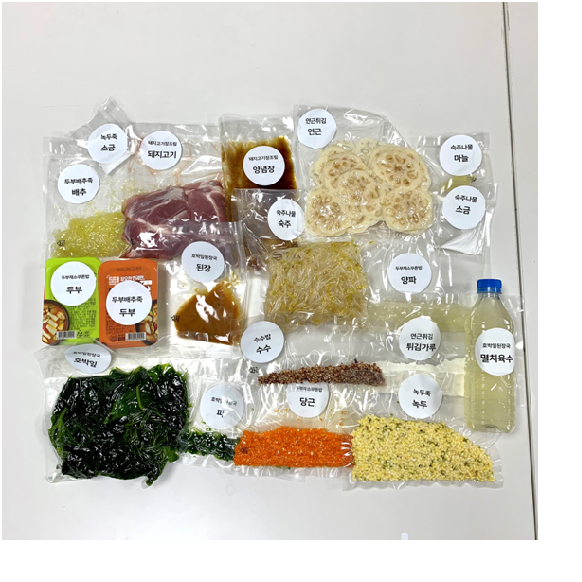 |
| ▲ Meal kit set for children’s composition (Source: Institutional foodservice lab) |
In 2016, CWNU was recognized as a university that fosters’ enterprises and business establishments by national universities and public universities in the Gyeongnam area. To this day, CWNU supports the startup clubs of CWNU students and tries to foster creative leaders. Kim Seo-jin is a member of the CWNU ‘Institutional Food Service’ business startup club. The Campus Journal met up with Kim Seo-jin to learn more about ‘Institutional Food Service’ and why it has attracted so much attention and so many prizes.
Q: Please introduce yourself and the members of the club.
Kim: Hello, I’m Kim Seo-jin, a team leader of the CWNU startup club called ‘Institutional Foodservice Lab’. Our club was founded in 2020. There are seven members in our club, Park Jae-hui, Park Hui-jin, Jo Min-seong, Jeong Yu-na, Kim Seong-mi, Lee Chae-young, and me.
Q: Why did you choose to do a ‘Children's Meal Service’?
Kim: When I was senior, I worked in a nutritionist work placement. While working there I learned a lot about the business of making meals and management in the 1 Support Center for the Children's Meal Service of Changwon-si. The 1 Support Center for the Children's Meal Service of Changwon-si is the business that aids the management of the sanitation and nutrition to provide high quality meals for school cafeterias that are run without a nutritionist. I got to know that among the school cafeterias that are affiliated with this center, more than a majority were children’s cafeterias serving a small number of children. In these cafeterias, the owner of a childcare center often works in multiple roles such as teacher, cook, and driver because there are few cafeteria staff members and a small scale of operations. So although the center provides recipes to these cafeterias, the owner of a childcare center have a difficult time buying the ingredients according to the recipe in addition to cooking and distributing the meals.
So we developed a ‘Meal Kit for Small School Cafeterias’. By providing these meal kits to small school cafeterias, they can cook the school meals easily while maintaining a high meal quality.
Q: Please explain what is included in the ‘Meal Kit Set for Children’.
Kim: The meal kit includes prepped ingredients, sauces, and school meal recipes. We chose the meal kit set’s ingredients according to the standard 5 serving recipes of the Support Center for Children's Meal Service. We prepped and wrapped the ingredients, so everyone who buys this set can easily cook the recipes without needing to prep the ingredients or make sauces. The price for the meal kit is about 14,200 won based on food ingredients and operating expenses based on 100 servings (2,840 won per serving). This price can be further reduce because the more cafeterias that make purchasing contracts, the less the ingredients will cost.
Q: What is the difference between the ‘Institutional Foodservice Lab’s Meal kit Set for Children’ and meal kit sets for children available in the market?
Kim: The biggest difference is what comes with the meal kit. The meal kits currently on sale come with recipes for one serving to four servings maximum. But the ‘Meal Kit Set for Children’ that we made provided a minimum of five servings. the meal kit allows cafeterias to create healthy main dishes and side dishes for a well-rounded diet and also ingredients necessary to make snacks.
Q:Did you face any problems when making the meal kit?
Kim: we had a difficult time doing a survey to collect data when developing the meal kit. The survey targeted teachers of kindergarten and pre-kinder. we called teachers to ask them to participate in the survey, but the response rate was lower than we expected, making it difficult to get useful survey results.
Q: Do you have anything planned for the future for the startup club?
Kim: At first we developed this kit for small children's cafeterias, but we will be making a meal kit for 10 servings and 20 servings so that large-scale cafeterias can use it. And we also plan to develop a ‘senior friendly meal kit’ with existing club members and new members, The ‘senior friendly meal kit’ is a senior friendly meal kit for seniors.
Q: What is something that you would like to say to your team’s members?
Kim: Thanks to this project we’ve won prizes and had interviews. I feel really great and I want to say thank you to my club’s members for putting in so much effort with me.
The reason that the club won prizes was that they identified a problem through personal experience. Then through trial and error they developed a meal kit set so that it’s easier to make large meals to serve groups of people. In the future, it won’t be surprising to see many start-up clubs, including the Institutional Food Service Lab, becoming successful through creative ideas and hard effort. With this determination and strong support from the school, everyone will be able to benefit from the fostering of young entrepreneurs.
By Lee Yeon-jin, cub-reporter dlduswls45@naver.com
<저작권자 © The Campus Journal, 무단 전재 및 재배포 금지>

 Shrinkflation, Consumer Deception
Shrinkflation, Consumer Deception




